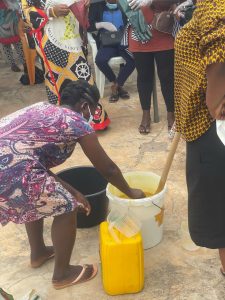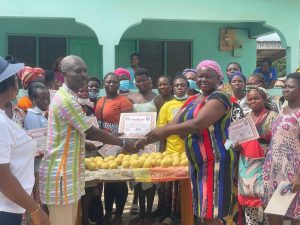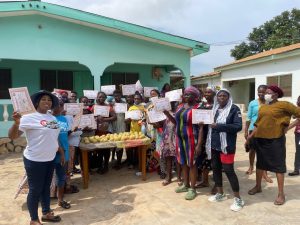INTRODUCTION
The Complementary Education Agency (CEA) has continued its efforts in enhancing vocational skills and economic opportunities for individuals in various communities. As part of the department’s quarterly initiative, a skill training session was organised focusing on soap making (Azumah Blows) on the 19th of June, 2025. A total number of 35 participants were in attendance. The report outlines the objectives, activities, challenges and recommendations derived from this training.
OBJECTIVE
The objective of the training was to provide learners with the knowledge and skills necessary to produce high-quality and good (Azumah Blows) products, as well as empower individuals to create additional source of income.
ACTIVITY
The training was organised by the Complementary Education Agency, with a support from the Kpone-Katamanso Municipal Assembly on 19th of June, 2025 in Kpone. The programme began with a prayer by Madam Mary Arhin, a learner and a brief speech from Mr. Zac Abrahams, the Municipal Director at the Complementary Education Agency. He welcomed the learners at the programme and gave a statement of purpose and the relevance of the training to them. He encouraged the learners to participate fully in the training to acquire some skills to also rely on since having multiple sources of income were of great benefit.
Mrs. Florence Okosso, Director for Commission of the Human Right and Administrative Justice (CHRAJ) and Madam Sandra Boison, from the department of Culture, Tourism and Creative Arts. Mrs. Comfort Quainoo from the Department of National Commission for Civic Education (NCCE) gave a word of encouragement to the learners and stated out the mandate of their respective departments.
An expert trainer engaged the learners in a discussion on entrepreneurship, marketing fundamentals, pricing strategies, customer engagements and profits in the local soap (Azumah Blows) production business. Participants asked a few questions on the hands-on training began. They were taken through the procedures and the ingredients needed for local soap (Azumah Blows) production. The programme came to a successful end with a word of exhortation and gratitude from Mr. Immanuel Nii-Larte Lartey, National Service Authority (NSA) Director.
CHALLENGES
Notwithstanding the training’s success, few challenges were identified that needed to be addressed by the appropriate stakeholders. These included;
*Learners wish training comes off monthly instead of quarterly.
*Start-up capital for learners/participant to begin their own businesses.
RECOMMENDATIONS
*The office suggests to management of the assembly that skills training should come off monthly instead of quarterly.
*Learners should be given start-up capital to commence small businesses on their own.
CONCLUSION
The skills training on the locally-produced soap (Azumah Blows) achieved its objectives, providing learners with the knowledge and skills necessary to produce high-quality soap (Azumah Blows) products and empowering the learners to create additional sources of income.

Learners/participators learning the preparation of locally-produced soap (Azumah Blows)

Municipal Director presenting certificates of participation to learners.

Participants displaying their certificates in a group photograph.
